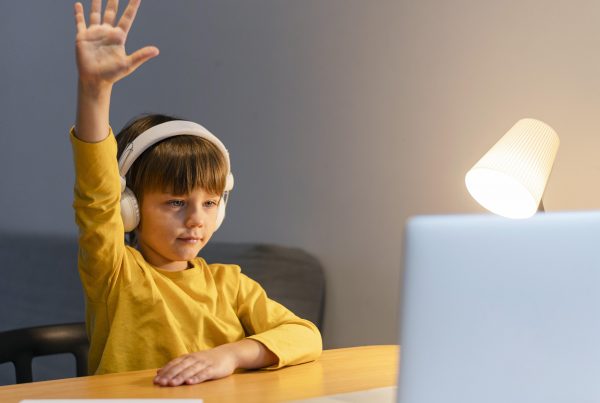Neseniai atliktas mokslinis tyrimas parodė, kad vaikai, kurie ankstyvoje vaikystėje išmoko tinkamai sukoncentruoti dėmesį, pasiekia daug aukštesnių rezultatų ne tik mokykloje, bet ir universitete. Turėdami tą omenyje, pateikiame keletą patarimų, padėsiančių vaikams išmokti susikaupti.
- Padėkite vaikams suprasti savo jausmus. Mokslininkai sako, kad vaikai, kurie susiduria su dėmesio sutelkimo problemomis, nemoka kontroliuoti savo jausmų, nes mokymosi procesas ir susikaupimas reikalauja gebėjimo valdyti emocijas. Vaikai gali jaustis labai sunerimę dėl ko nors, kas visiškai nesusiję su reikiama atlikti užduotimi, o tai, natūraliai, labai blaško jų dėmesį. Suraskite pagrindinę vaiko nerimo priežastį ir pasikalbėkite apie tai su mažyliu. Su tėvų pagalba net ir didžiausios problemos nebeatrodo tokios jau didelės. Taip pat svarbu, kad vaikas suprastų, jog viskam yra ribos, ir netgi kai jis nusiminęs, emocijos negali kontroliuoti jo elgesio.
- Ribokite laiką, kurį vaikas gali praleisti prie kompiuterio/televizoriaus/planšetinio kompiuterio/išmaniojo telefono ekrano. Nesunku pastebėti, kad kartais vaikas gali ištisas valandas praleisti prie televizoriaus ekrano, tačiau negali penkiolikai minučių sutelkti dėmesio, kad atliktų matematikos namų darbus. Moksliniai tyrimai rodo, kad vaikams, kurie praleidžia itin daug laiko prie įvairių išmaniųjų prietaisų ekrano, sunkiau sekasi sukoncentruoti ir išlaikyti dėmesį mokykloje.
- Duokite vaikui konkrečius nurodymus. Suskirstykite užduotis į keletą mažesnių užduotėlių. Taip ne tik užtikrinsite, kad vaikas suprato užduotį teisingai, bet ir ugdysite organizacinius vaiko sugebėjimus.
- Pripažinkite ribas. Net ir suaugusieji ne visada gali lengvai ilgam laikui sutelkti dėmesį. Kaip orientyrą gali naudoti vaiko amžių – penkiametis turėtų gebėti susikoncentruoti bent penkioms minutėms, o dešimtmečio mintys pradės klaidžioti maždaug po dešimties minučių. Tai žinodami, suskaidykite užduotis į atitinkamus laiko tarpus.
- Nustatykite laikmatį. Paprastas laikmatis padės ugdyti vaiko laiko valdymo įgūdžius. Žinodamas, kad turi ribotą laiko tarpą atlikti užduočiai, mintimis atitrūkęs nuo užduoties greit prie jos sugrįš. Laikmatis taip pat parodo, kad vaiko darbas turi pabaigą, o tai dažnai suteikia vaikams ne tik palengvėjimą, bet ir motyvacijos.
- Žaiskite žaidimus. Pasak mokslininkų, judėjimo ar muzikiniai žaidimai padeda vaikams ugdyti dėmesio sukoncentravimo įgūdžius.
- Dėliokite dėliones ir statykite iš kaladėlių. Dėlionės bei statiniai iš kaladėlių skatina vaikus tyčiomis susikaupti.
- Kontroliuokite savo paties elgesį. Niekam ne paslaptis, kad vaikai dažnai perima tėvų elgesio modelį. Jeigu dažnai vaikui skiriate tik dalį savo dėmesio, viena akimi skaitydami elektroninį paštą telefone, turėkite omenyje, kad taip rodote vaikui ne itin tinkamą pavyzdį.
- Suteikite saugią aplinką. Svarbiausia, kad vaikas jaustųsi saugus ir žinotų, jog šalia visada yra mylintis suaugusysis, kuriuo jis gali pilnai pasitikėti. Be saugumo jausmo vaikas tikrai negalės pilnai susikoncentruoti, nes nesaugumo keliamas nerimas nuolat blaškys dėmesį.
Jei jūsų vaikui kyla sunkumų sutelkiant dėmesį, Brain Gym centras gali Jums padėti. Registracija į NEMOKAMĄ konsultaciją el.paštu: brain@braingym.lt
Facebook Comments






